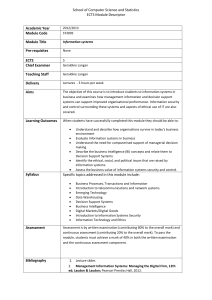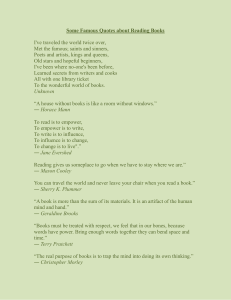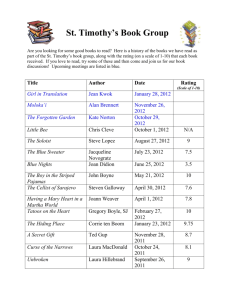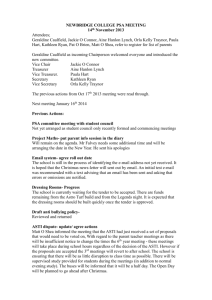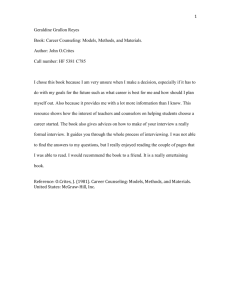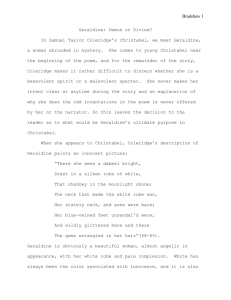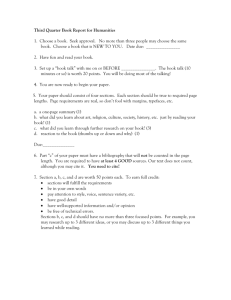Reading Fiction Post-test Study Guide
advertisement
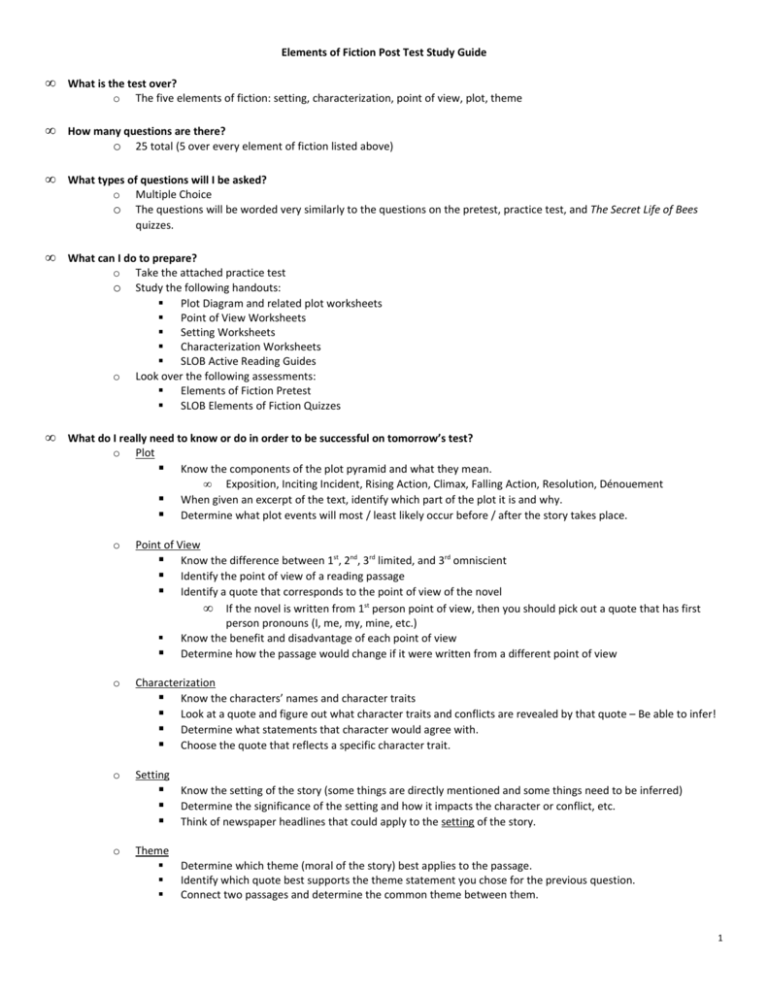
Elements of Fiction Post Test Study Guide • What is the test over? o The five elements of fiction: setting, characterization, point of view, plot, theme • How many questions are there? o 25 total (5 over every element of fiction listed above) • What types of questions will I be asked? o Multiple Choice o The questions will be worded very similarly to the questions on the pretest, practice test, and The Secret Life of Bees quizzes. • What can I do to prepare? o Take the attached practice test o Study the following handouts: Plot Diagram and related plot worksheets Point of View Worksheets Setting Worksheets Characterization Worksheets SLOB Active Reading Guides o Look over the following assessments: Elements of Fiction Pretest SLOB Elements of Fiction Quizzes • What do I really need to know or do in order to be successful on tomorrow’s test? o Plot Know the components of the plot pyramid and what they mean. • Exposition, Inciting Incident, Rising Action, Climax, Falling Action, Resolution, Dénouement When given an excerpt of the text, identify which part of the plot it is and why. Determine what plot events will most / least likely occur before / after the story takes place. o Point of View Know the difference between 1st, 2nd, 3rd limited, and 3rd omniscient Identify the point of view of a reading passage Identify a quote that corresponds to the point of view of the novel • If the novel is written from 1st person point of view, then you should pick out a quote that has first person pronouns (I, me, my, mine, etc.) Know the benefit and disadvantage of each point of view Determine how the passage would change if it were written from a different point of view o Characterization Know the characters’ names and character traits Look at a quote and figure out what character traits and conflicts are revealed by that quote – Be able to infer! Determine what statements that character would agree with. Choose the quote that reflects a specific character trait. o Setting o Know the setting of the story (some things are directly mentioned and some things need to be inferred) Determine the significance of the setting and how it impacts the character or conflict, etc. Think of newspaper headlines that could apply to the setting of the story. Theme Determine which theme (moral of the story) best applies to the passage. Identify which quote best supports the theme statement you chose for the previous question. Connect two passages and determine the common theme between them. 1 Name: ___________________________________________ Date: ______________ Class Period: _____________ Elements of Fiction Practice Test Objective: By answering the following multiple choice questions, I will be able to determine which of the following skills I need to work on before the post test: point of view, setting, characterization, plot, or theme. “Geraldine Moore the Poet” By Toni Cade Bambara 1 2 3 4 5 6 7 8 9 10 11 12 13 14 Geraldine paused at the corner to pull up her knee socks. The rubber bands she was using to hold them up made her legs itch. She dropped her books on the sidewalk while she gave a good scratch. But when she pulled the socks up again, two fingers poked right through the top of her left one. “That stupid dog,” she muttered to herself, grabbing her books and crossing against traffic. “First he chews up my gym suit and gets me into trouble, and now my socks.” Geraldine shifted her books to the other hand and kept muttering angrily to herself about Mrs. Watson’s dog, which she minded two days a week for a dollar. She passed the hot-dog man on the corner and waved. He shrugged as if to say business was very bad. Must be, she thought to herself. Three guys before you had to pack up and forget it. Nobody’s got hotdog money around here. Geraldine turned down her street, wondering what her sister Anita would have for her lunch. She was glad she didn’t have to eat the free lunches in high school anymore. She was sick of the funny-looking tomato soup and the dried-out cheese sandwiches and those oranges that were more green than orange. When Geraldine’s mother first took sick and went away, Geraldine had been on her own except when Miss Gladys next door came in on Thursdays and cleaned the apartment and made a meatloaf so Geraldine could have dinner. But in those days Geraldine never quite managed to get breakfast for herself. So she’d sit through social studies class, scraping her feet to cover up the noise of her stomach growling. Now Anita, Geraldine’s older sister, was living at home waiting for her husband to get out of the army. She usually had something good for lunch--chicken and dumplings if she managed to get up in time, or baked ham from the night before and sweet-potato bread. But even if there was only a hot dog and some baked beans--sometimes just a TV dinner if those soap operas kept Anita glued to the TV set--anything was better than the noisy school lunchroom where monitors kept pushing into a straight line or rushing you to the tables. Anything was better than that. Geraldine was almost home when she stopped dead. Right outside her building was a pile of furniture and some boxes. That wasn’t anything new. She had seen several people get put out on the street before, but this time the ironing board looked familiar. And she recognized the big, ugly sofa standing on its arm, its underbelly showing the hole where Mrs. Watson’s dog had gotten to it. Miss Gladys was sitting on the stoop, and she looked up and took off her glasses. “Well, Gerry,” she said slowly, wiping her glasses on the hem of her dress, “looks like you’ll be staying with me for a while.” She looked at the men carrying out a big box with an old doll sticking up over the edge. “Anita’s upstairs. Go on up and get your lunch.” Geraldine stepped past the woman and almost bumped into the superintendent. He took off his cap to wipe away the sweat. “Darn shame,” he said to no one in particular. “Poor people sure have a hard row to hoe.” “That’s the truth,” said Miss Gladys, standing up with her hands on her hips to watch the men set things on the sidewalk. Upstairs, Geraldine went into the apartment and found Anita in the kitchen. “I dunno, Gerry,” Anita said. “I just don’t know what we’re going to do. But everything’s going to be 2 15 16 17 18 19 20 21 22 23 24 25 26 27 28 29 30 31 32 33 all right soon as Ma gets well.” Anita’s voice cracked as she set a bowl of soup before Geraldine. “What’s this?” Geraldine said. “It’s tomato soup, Gerry.” Geraldine was about to say something. But when she looked up at her big sister, she saw how Anita’s face was getting all twisted as she began to cry. That afternoon, Mr. Stern, the geometry teacher, started drawing cubes and cylinders on the board. Geraldine sat at her desk adding up a column of figures in her notebook--the rent, the light and gas bills, a new gym suit, some socks. Maybe they would move somewhere else, and she could have her own room. Geraldine turned the squares and triangles into little houses in the country. “For your homework,” Mr. Stern was saying with his back to the class, “set up your problems this way.” He wrote GIVEN: in large letters, and then gave the formula for the first problem. Then he wrote TO FIND: and listed three items they were to include in their answers. Geraldine started to raise her hand to ask what all these squares and angles had to do with solving real problems, like the ones she had. Better not, she warned herself, and sat on her hands. Your big mouth got you in trouble last term. In hygiene class, Mrs. Potter kept saying that the body was a wonderful machine. Every time Geraldine looked up from her notebook, she would hear the same thing. “Right now your body is manufacturing all the proteins and tissues and energy you will need to get through tomorrow.” And Geraldine kept wondering, How? How does my body know what it will need, when I don’t even know what I’ll need to get through tomorrow? As she headed down the hall to her next class, Geraldine remembered that she hadn't done the homework for English. Mrs. Scott had said to write a poem, and Geraldine had meant to do it at lunchtime. After all, there was nothing to it -- a flower here, a raindrop there, moon, June, rose, nose. But the men carrying off the furniture had made her forget. “And now put away your books,” Mrs. Scott was saying as Geraldine tried to scribble a poem quickly. “Today we can give King Arthur's Knights a rest. Let's talk about poetry.” Mrs. Scott moved up and down the aisles talking about her favorite poems and reciting a line now and then. She got very excited whenever she passed a desk and could pick up the homework from a student who had remembered to do the assignment. “A poem is your own special way of saying what you feel and what you see,” Mrs. Scott went on, her lips moist. It was her favorite subject. “Some poets write about the light that... that...makes the world sunny,” she said, passing Geraldine's desk. “Sometimes an idea takes the form of a picture--an image.” For almost half an hour Mrs. Scott stood at the front of the room, reading poems and talking about the lives of great poets. Geraldine drew more houses and designs for curtains. So for those who haven't done their homework, try it now,” Mrs. Scott said. “Try expressing what it is like to be...alive in this....this glorious world.” “Oh brother,” Geraldine muttered to herself as Mrs. Scott moved up and down the aisles again, waving her hands and leaning over the student's shoulders and saying, “That's nice,” or “keep trying.” Finally she came to Geraldine's desk and stopped, looking down at her. “I can't write a poem,” Geraldine said flatly, before she even realized she was going to speak at all. She said it very loudly and the whole class looked up. “And why not?” Mrs. Scott asked, looking hurt. “I can't write a poem, Mrs. Scott, because nothing lovely's been happening in my life. I haven't seen a flower since Mother's Day, and the sun don't even shine on my side of the street. No robins come sing on my window sill.” Geraldine swallowed hard. She thought about saying that her father doesn't even come to visit any more, but changed her mind. “Just the rain comes,” she went on, “and the bills come, and the men to move out 3 34 35 36 37 our furniture. I'm sorry, but I can't write no pretty poem.” Teddy Johnson leaned over and was about to giggle and crack the whole class up, but Mrs. Scott looked so serious that he changed his mind. “You have just said the most...the most poetic thing, Geraldine Moore,” said Mrs. Scott. Her hands flew up to touch the silk scarf around her neck. “Nothing lovely's been happening in my life.” She repeated it so quietly that everyone had to lean forward to hear. “Class,” Mrs. Scott said very sadly, clearing her throat, “You have just heard the best poem you will ever hear.” She went to the board and stood there for a long time staring at the chalk in her hand. “I'd like you to copy it down,” she said. She wrote it just as Geraldine had said it, bad grammar and all: Nothing lovely's been happening in my life. I haven't seen a flower since Mother's Day, And the sun don't even shine on my side of the street. No robins come sing on my window sill Just the rain comes, and the bills come, And the men to move out our furniture. I'm sorry, but I can't write no pretty poem. 38 39 1. Mrs. Scott stopped writing but she kept her back to the class for a long time --long after Geraldine had closed her notebook. And even when the bell rang and everyone came over to smile at Geraldine or to tap her on the shoulder or to kid her about being the school poet, Geraldine waited for Mrs. Scott to put the chalk down and turn around. Finally Geraldine stacked up her books and started to leave. Then she thought she heard a whimper--the way Mrs. Watson's dog whimpered sometimes--and she saw Mrs. Scott's shoulders shake a little. This story is told from what point of view? a. First person because the narrator is writing from her own experience and we are able to see her thoughts and feelings. b. Second person because the narrator directly addresses the reader and the action does not surround a specific character. c. Third person omniscient because the narrator seems to know everything about Geraldine, her sister, and her teachers. d. Third person limited because the narrator is not in the story and seems to only understand Geraldine’s character. 2. What plot event most likely occurred in Geraldine’s life before the story takes place? a. b. She signed up to volunteer at the local animal shelter walking dogs. She got a detention at school because she did not dress out in gym class. c. Her father called to ask how she and her mother were doing. d. Her sister and her sister’s husband invited Geraldine to live with them. 3. What is the importance of the story taking place at school rather than over summer break? a. Geraldine feels the added pressure of school work on top of her other growing problems. b. Geraldine is able to escape from her everyday problems by going to school. c. Geraldine’s lunches are free at school so it helps her family financially. d. Geraldine sees other students at school who are going through the same problems. 4 4. What is revealed about the teacher’s character in the following quote? “You have just said the most...the most poetic thing, Geraldine Moore,” said Mrs. Scott. a. She is sarcastic and doesn’t think that Geraldine can write poetry. b. She is open-minded and wants Geraldine to feel good about herself. c. She is a bad teacher because she cannot recognize good poetry. d. She is a sad person who needs poetry to make her life happy. 5. What do paragraphs 8-9 establish in the story? a. The exposition because it develops the setting of the apartment where Geraldine lives b. The inciting incident because Geraldine’s inner conflict about her family’s problems begins here c. The rising action because tension is added to Geraldine’s conflict about her neighbor’s dog d. The resolution because her conflict about having to eat the free lunch at school has been resolved. 6. Which of the following best demonstrates the point of view of the story? a. b. c. d. How does my body know what it will need, when I don’t even know what I’ll need to get through tomorrow? “I just don’t know what we’re going to do. But everything’s going to be all right soon as Ma gets well.” Then she thought she heard a whimper--the way Mrs. Watson's dog whimpered sometimes “You have just said the most...the most poetic thing, Geraldine Moore” 7. Which of the following lines from the story serves as evidence to prove that the teacher is sad about Geraldine’s situation? a. b. c. d. Then she thought she heard a whimper--the way Mrs. Watson's dog whimpered sometimes--and she saw Mrs. Scott's shoulders shake a little “So for those who haven't done their homework, try it now,” Mrs. Scott said. “Try expressing what it is like to be...alive in this....this glorious world.” She got very excited whenever she passed a desk and could pick up the homework from a student who had remembered to do the assignment. Teddy Johnson leaned over and was about to giggle and crack the whole class up, but Mrs. Scott looked so serious that he changed his mind. 8. Which best explains how the setting of the school contributed to the development of the story? a. She is forced to open up and discuss her situation which leads to the discovery of her gift for poetry. b. She harshly questions her teachers about life lessons which causes conflict and tension. c. She sees that no one else at school seems to have the same problems which makes her feel alone. d. She affectionately connects with Mrs. Scott which allows her to feel happy for the first time. 9. After the conclusion of the story, which of the following is least likely to occur to Geraldine: a. Her sister’s husband will return from the army and start to help the family out. b. She will start to feel more connected at school now that her classmates know who she is. c. She will continue to feel that poetry is something only happy, satisfied people can write. d. Her neighbor will ask Geraldine to watch the dog more often in return for staying at her house. 10. What is a benefit of the story being written from this particular point of view? a. b. c. d. The reader has access to the neutral perspective about the conflict between the girl and the teacher. The reader encounters a harsh and direct opinion of the girl’s thoughts and feelings about school. The reader receives an intimate, first hand account of the girl’s feelings about her family life. The reader has an objective view of the situation but knows the girl’s feelings about writing poetry. 11. Which recent newspaper headline title could best be related to the setting of the story? a. “Spice Up Your Dinner Menu: New Fall Recipes” b. “The Fox Hosts 10th Annual Poetry Night” c. “It’s Your Turn: Taking Care of Sick Parents” d. “Local High School Discovers New Talent” 5 12. The author has Geraldine’s Geometry teacher discuss math problems to develop: a. b. c. Setting – to show that even in a poor neighborhood, children are still provided with a quality education Theme – to illustrate that students should always respect their teachers by not talking back Plot – to create a conflict when Geraldine begins to question the importance of school work d. Point of View – to offer another character’s viewpoint on the situation, the Math teacher’s 13. What is revealed about Geraldine when she says, “I can’t write a poem, Mrs. Scott, because nothing lovely’s been happening in my life. I haven’t seen a flower since Mother’s Day, and the sun don’t even shine on my side of the street. No robins come sing on my window sill”? a. She has a low self-esteem because people always tell her she can’t be successful in school without having a male role model at home. b. She is angry that she has asked for help several times, but her teachers ignore her because she doesn’t have as much money as other kids. c. She is disrespectful to authority figures because she was severely abused while in foster care throughout her whole life. d. She is frustrated about her tough home situation and cannot focus on school assignments because she is distracted by her hardships. 14. What is a disadvantage of the story being written from this particular point of view? a. b. c. d. The reader is given the message directly, so at times it can feel as though the narrator is too harsh and demanding. The reader is given an outsider’s account of what happened, so there is a lack of connection or bond with the main characters. The reader sees through one character’s eyes, so there is limited access to other characters’ thoughts and feelings. The reader knows every character’s thoughts and feelings, so it is hard to side with one character over another. 15. With which of the following statements would Geraldine most likely agree: a. It is easy to overcome your hardships if you have a special talent. b. Life would be easy if you did not have to attend school and do homework. c. d. It is easy to ignore your worries if you are challenged academically. It is hard to think about school when you are worried about surviving. 16. Which best explains how the setting of lunchtime contributes to the conflict? a. b. c. Geraldine is starving at school and therefore she cannot concentrate on her schoolwork. Geraldine goes home for lunch so she is able to see that her family has been kicked out of their home. Geraldine gets to spend time with her sister during the school day so she feels better about life. d. Geraldine has to walk all the way home which forces her to dwell on her problems. 17. Which of the following best states the theme of the story? a. Sometimes personal hardship can help you recognize your true strengths. b. c. d. Being poor can be difficult, but you can overcome poverty with a positive attitude. Leaning on your family can help you get through tough times Whatever you are passionate about in life, you should share with other people. 18. Which of the following serves as a supporting detail for the theme of the story? a. “She was glad she didn’t have to eat the free lunches in high school anymore. She was sick of the funny-looking tomato soup and the dried-out cheese sandwiches and those oranges...” b. “She got very excited whenever she passed a desk and could pick up the homework from a student who had remembered to do the assignment.” c. “‘You have just said the most...the most poetic thing, Geraldine Moore,’ said Mrs. Scott…‘Nothing lovely's been happening in my life.’ She repeated it so quietly that everyone had to lean forward to hear.” d. “A poem is your own special way of saying what you feel and what you see,’ Mrs. Scott went on, her lips moist. It was her favorite subject.” 6
